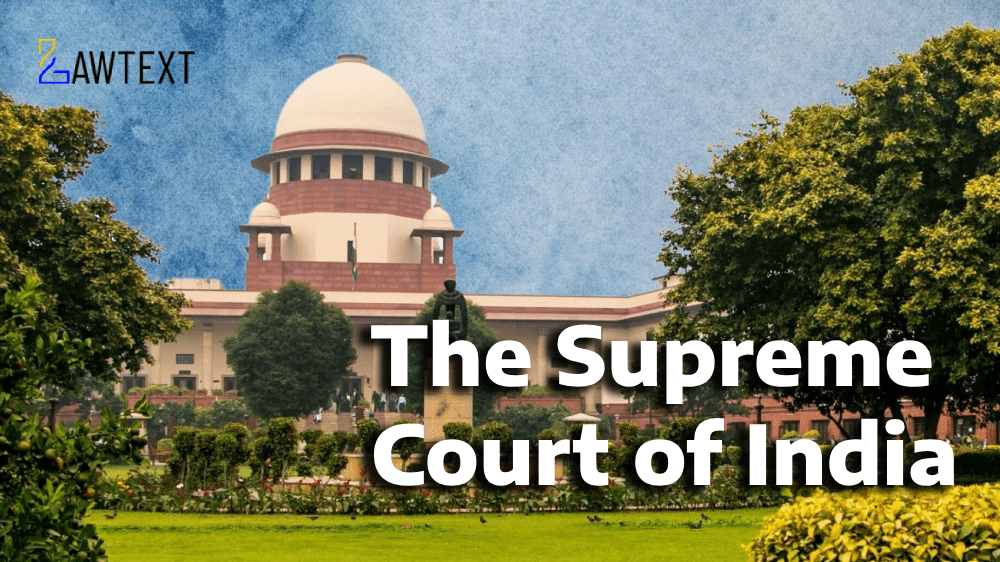CASE NOTE & SUMMARY
Supreme Court upheld dismissal from service imposed on an Assistant Engineer convicted of bribery, emphasizing that judicial review in disciplinary matters is limited, acquittal in criminal proceedings does not bar departmental action, and departmental proceedings follow the standard of preponderance of probabilities.
Major Acts & Sections:
- Constitution of India, 1950 – Article 226 – Writ jurisdiction – Limited scope of interference in disciplinary proceedings.
- Code of Criminal Procedure, 1973 – Section 162 – Confessional statements in departmental inquiries.
- Indian Evidence Act, 1872 – Sections 25, 26 – Confession made before a police officer – Inadmissibility in criminal proceedings but permissible in departmental proceedings.
- Prevention of Corruption Act, 1988 – Sections 7, 13(2) read with 13(1)(d) – Demand and acceptance of bribe.
- Indian Penal Code, 1860 – Section 34 – Common intention.
Subjects:
Judicial Review – Standard of Proof – Preponderance of Probabilities – Disciplinary Authority – Acquittal Not Honourable – Scope of Interference – Bias in Inquiry – Departmental Proceedings – Evidence Evaluation – Confessional Statements – Limited Judicial Scrutiny
Nature of Litigation:
Appeal by Airports Authority of India against the judgment of the High Court setting aside the dismissal order of an Assistant Engineer, who was earlier convicted for bribery but later acquitted on the ground of benefit of doubt.
Relief Sought:
The appellant sought to reinstate the order of dismissal from service, arguing that departmental proceedings and criminal trials are distinct, and the High Court erroneously interfered with a legally valid disciplinary action.
Reason for Filing the Case:
The Division Bench of the High Court had set aside the disciplinary proceedings on the ground that the acquittal of the respondent in the criminal appeal exonerated him, thereby invalidating the disciplinary action taken by the Airports Authority of India.
Prior Decisions:
- The Special Judge, CBI Court, convicted the respondent.
- The High Court acquitted the respondent in a criminal appeal, giving him the benefit of doubt.
- The Disciplinary Authority dismissed him from service despite the acquittal.
- The High Court’s Division Bench, in an intra-court appeal, set aside the dismissal order, prompting the appeal to the Supreme Court.
Issues:
a) Whether the disciplinary proceedings against the respondent were valid despite his acquittal in the criminal case.
b) Whether the High Court exceeded its jurisdiction by re-evaluating evidence in an intra-court appeal.
c) Whether non-examination of the complainant vitiated the disciplinary proceedings.
d) Whether the standard of proof in departmental proceedings differs from criminal trials.
Submissions/Arguments:
On behalf of the Appellant (Airports Authority of India):
- Standard of Proof – Departmental proceedings rely on the preponderance of probabilities, not proof beyond reasonable doubt.
- Judicial Review Scope – The High Court exceeded its jurisdiction under Article 226 by interfering in the disciplinary findings.
- Acquittal Not Honourable – The acquittal was based on benefit of doubt, not a declaration of innocence, and does not preclude disciplinary proceedings.
- Independent Evaluation of Evidence – The Enquiry Officer was not bound by findings of the criminal court and could independently assess evidence.
- Confessional Statements Admissible – The confession given before the CBI was admissible in the disciplinary proceedings despite its inadmissibility in the criminal trial.
On behalf of the Respondent (Pradip Kumar Banerjee):
- Lack of Complainant’s Testimony – The complainant was not examined in the disciplinary proceedings, making the charges unproven.
- Lack of Role in Financial Decisions – As an Assistant Engineer, the respondent had no role in bill preparation, negating bribery allegations.
- Finality of Acquittal – The acquittal by the High Court should have been given due weight, and fresh departmental proceedings should not have been initiated.
- Violation of Natural Justice – The disciplinary proceedings were biased as the same authority acted at multiple stages.
Decision:
- Acquittal in a criminal case does not automatically invalidate departmental proceedings.
- Departmental enquiries are governed by the preponderance of probabilities, not proof beyond reasonable doubt.
- The High Court erred in interfering with the findings of the Disciplinary Authority and re-evaluating evidence in a writ appeal.
- Non-examination of the complainant was not fatal to the case as other credible evidence was available.
- Confessional statements before CBI officers, though inadmissible in a criminal trial, were valid in departmental proceedings.
Ratio Decidendi:
a) Disciplinary proceedings and criminal trials operate under different evidentiary standards – Preponderance of probabilities suffices for disciplinary action, unlike the stricter standard of proof beyond reasonable doubt in criminal cases.
b) Limited scope of judicial review in disciplinary matters – High Courts cannot act as appellate authorities to re-evaluate evidence.
c) Acquittal based on benefit of doubt does not entitle reinstatement – Only an honourable acquittal, which establishes innocence, can be a ground for reversing a dismissal.
d) Admissibility of evidence in disciplinary proceedings – Statements made to CBI officers and testimony from trap witnesses are permissible evidence.
e) Judicial discipline in intra-court appeals – A Division Bench should not interfere with factual findings unless there is a clear perversion of justice.
Final Order:
- The appeal was allowed.
- The High Court’s judgment setting aside the dismissal was reversed.
- The disciplinary action against the respondent, including dismissal from service, was upheld.
Citation: 2025 LawText (SC) (2) 43
Case Number: CIVIL APPEAL NO(S). 8414 OF 2017
Date of Decision: 2025-02-04
Case Title: AIRPORTS AUTHORITY OF INDIA VERSUS PRADIP KUMAR BANERJEE
Before Judge: (J.K. MAHESHWARI J. , SANDEEP MEHTA J. )
Appellant: AIRPORTS AUTHORITY OF INDIA
Respondent: PRADIP KUMAR BANERJEE

